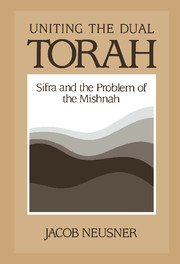Book contents
- Frontmatter
- Contents
- Preface
- Prologue
- 1 The Problem of the Mishnah
- 2 Torah as a Common Noun: The Solution of the Talmuds
- 3 A Sample of Sifra
- 4 From Common Noun to Proper Noun: Sifra's Re-presentation of the Two Torahs as One
- 5 Sifra's Alternative to the Mishnah's Topical Program and Its Order
- 6 Sifra's Alternative to the Mishnah's Logic of Cogent Discourse
- 7 Sifra's Alternative to the Mishnah's Proof of Propositions through Taxonomic Classification and Hierarchization
- 8 Re-presenting the Torah: Sifra's Rehabilitation of Taxonomic Logic
- 9 Torah as Proper Noun and the Structure of the Logic of Creation
- Appendix: The Distinctive Character of Sifra among Midrash Compilations
- Bibliography
- Index
Appendix: The Distinctive Character of Sifra among Midrash Compilations
Published online by Cambridge University Press: 06 July 2010
- Frontmatter
- Contents
- Preface
- Prologue
- 1 The Problem of the Mishnah
- 2 Torah as a Common Noun: The Solution of the Talmuds
- 3 A Sample of Sifra
- 4 From Common Noun to Proper Noun: Sifra's Re-presentation of the Two Torahs as One
- 5 Sifra's Alternative to the Mishnah's Topical Program and Its Order
- 6 Sifra's Alternative to the Mishnah's Logic of Cogent Discourse
- 7 Sifra's Alternative to the Mishnah's Proof of Propositions through Taxonomic Classification and Hierarchization
- 8 Re-presenting the Torah: Sifra's Rehabilitation of Taxonomic Logic
- 9 Torah as Proper Noun and the Structure of the Logic of Creation
- Appendix: The Distinctive Character of Sifra among Midrash Compilations
- Bibliography
- Index
Summary
The labor of classification through analysis of shared and unique qualities further tells us in what ways a writing replicates traits of aesthetics (e.g., rhetoric), philosophy (e.g., logic), and even theology (e.g., topical program) with other writings of its larger genus. What we will see is the singular character of Sifra when compared with other Midrash compilations of its time and place, and that fact places into perspective the results set forth in the preceding study. Specifically, we will see that the authorship of Sifra stands as a distinct group and sets forth a well-crafted position of its own. It shares with other writings some of its traits of rhetoric, logic, or topic, but with them never all. Therefore, my representation of a document that addresses issues and takes a position is sustained by the comparison of that document with others, both as to the indicative traits of the base document, and also as to the general traits characteristic of them all.
I undertake two distinct exercises of comparison, one for one species of writings in the canon of the dual Torah, one for the other. One species, universally defined by all parties to study, is that of “halakhic Midrashim,” by which is meant Midrash compilations of Midrash exegeses of legal passages of the Pentateuch. These are generally held to be Sifra and the two Sifrés, the one to Numbers, the other to Deuteronomy, as well as the Mekhilta attributed to R. Ishmael.
- Type
- Chapter
- Information
- Uniting the Dual TorahSifra and the Problem of the Mishnah, pp. 193 - 223Publisher: Cambridge University PressPrint publication year: 1990



